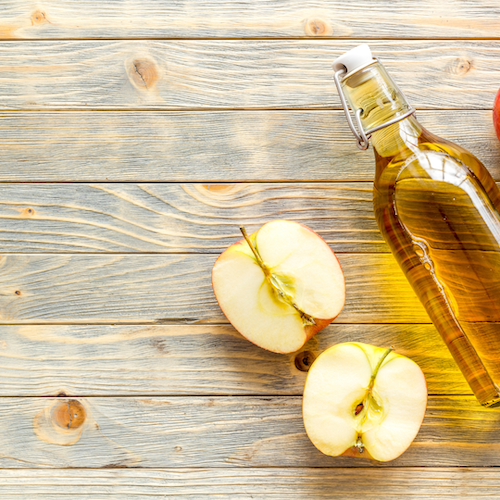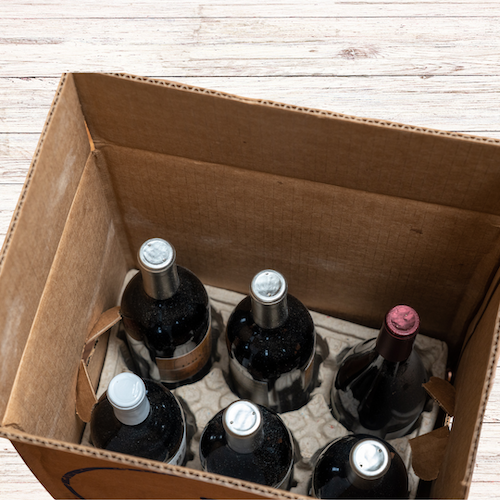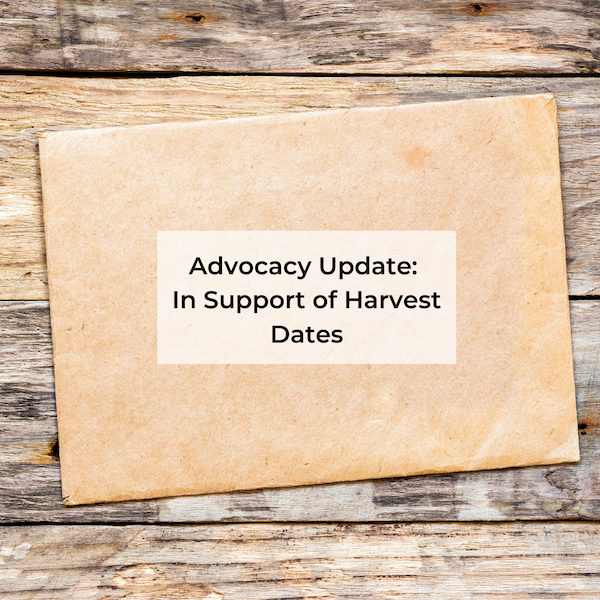Advocacy
Help Us Tell Cider’s Story: Take ACA’s 2022 Cider Production Survey
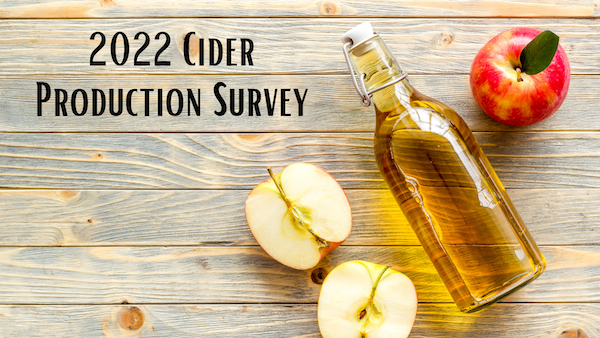
At the American Cider Association we work hard to support cider and cidermakers across the United States every day of the year, but we need your help to keep providing Congress, the media, and buyers with the most up-to-date and complete industry overview we possibly can. Please help us collect aggregated production information for the U.S. cider industry for 2022.
If you are licensed to make cider on a commercial basis we invite you to take our survey so we can gather information vital to promoting and protecting cider in the U.S.
Details:
- This survey will take about 20 minutes to complete.
- The survey is being aggregated and anonymized by an independent third party. They have agreed to not share information with us that might identify who you or your cidery are, and to only share aggregate data with us. YOUR PRIVACY MATTERS TO US.
- Your cidery name is collected by the 3rd party to ensure there are no duplicates, but the ACA will not store that information after the survey has been returned to us with identify features removed.
- We do ask a number of questions about sales and production for 2022. You will find it helpful to have that data handy before completing the survey.
- Note: If you produce wine or other beverages besides cider, please answer only considering your cider production.
- Deadline to complete the survey is August 10, 2023.
- Anyone who submits their completed survey and provides their contact info will be entered into a raffle to win an American Cider Association hoodie (4 available) and a grand prize winner will receive a complimentary ticket to CiderCon® 2024!
If you have any questions regarding this survey or how the data is used, please contact CEO of the American Cider Association Michelle McGrath.
We appreciate your help in allowing us to continue to promote cider across the United States!
Urge Congress to Support the USPS Shipping Equity Act
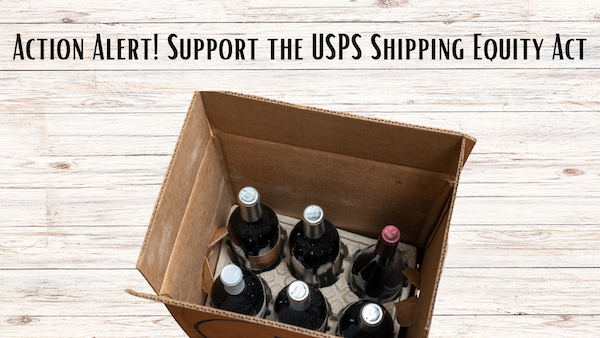
On May 23 Rep. Dan Newhouse (R-WA) once again introduced the USPS Shipping Equity Act in Congress alongside Rep. Jennifer Wexton (D-VA) and 8 other House co-sponsors. Currently, the U.S. Postal Service is not allowed to ship cider, beer, wine, or distilled spirits, because of a leftover, outdated ban put into effect during the Prohibition era. The USPS Shipping Equity Act would give parity to the US Postal Service, allowing it to ship licensed alcohol for commerce just like FedEex or UPS. Additionally, the USPS Shipping Equity Act gives rural producers access to another option for shipping alcoholic beverages. This bill is critical in leveling the playing field and increasing consumer and manufacturer choice while bringing in millions of dollars in revenue per year that will support small businesses, rural communities, agricultural enterprises and the US Postal Service.
We encourage you to email your Congressional representatives and urge them to cosponsor the USPS Shipping Equity Act. We have set up a campaign with an email template that you can use. Click the button below to be taken to the campaign. After you’ve emailed your reps, we encourage you to take a moment to share your actions on social media and via email to inspire others to reach out to their representatives as well.
Have questions? Please email ACA CEO Michelle McGrath.
ACA Joins with Organization to Support USPS Shipping Equity Act
The American Cider Association has been working with organizations across the United States to urge Congress to support the USPS Shipping Equity Act (H.R. 3287/S. 1663).
The U.S. Postal Service is not allowed to ship cider, beer, wine, or distilled spirits, because of a leftover, outdated ban put into effect during the Prohibition era. The result? Restricting options for producers and customers alike, affecting many U.S. cideries where e-commerce is essential for business. The USPS Shipping Equity Act would give parity to the Postal Service, allowing it to ship licensed alcohol for commerce just like FedEex or UPS. Additionaly, the USPS Shipping Equity Act gives rural producers access to another option for shipping alcoholic beverages.
Recently organizations across the country, including the ACA, signed on to a letter sent to members of Congress encouraging them to support the USPS Shipping Equity Act.
ACA Advocates for Ice Cider Standards
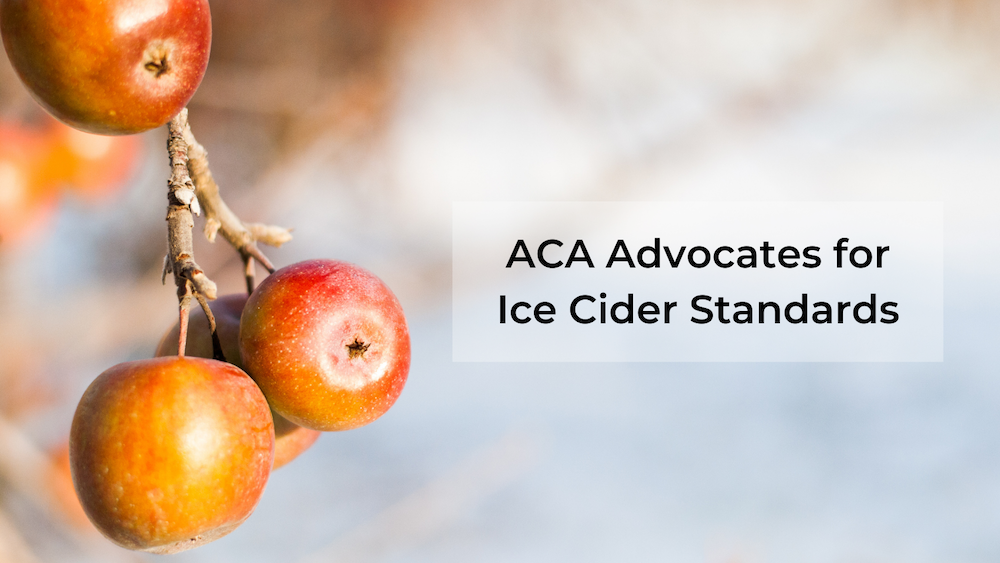
The board of the American Cider Association recently send a letter to the L’Association des Industries des Cidres et Vins de fruits de l’UE (AICV), or the European Cider and Fruit Wine Association urging them to recognize the precedent for the definition of Ice Cider (Cidre de Glace) set by the government of Quebec, Canada.
The AICV is currently in the process of developing marketing standards for Ice Cider/Apple Ice Wine in Europe and the ACA board felt it was timely to urge that the organization adopt the definition set by the government of Quebec, where the style of cider originated in the 1990s as the standard definition.
The definition is as follows: “Ice Cider” – cider obtained by the fermentation of juice of apples that has a pre-fermentation sugar content of not less than 30° Brix achieved solely by natural cold, producing a finished product with a residual sugar content of not less than 130 g per litre and an actual alcoholic strength of more than 7% by volume but not more than 13% by volume.”
This definition has been accepted by the ACA and by GLINTCAP and the required use of natural cold weather for cryo-extraction or cryo-concentration is enforced by our U.S. Federal Alcohol & Tobacco Tax & Trade Bureau (TTB) with respect to labeling.
You can read the full letter from the ACA board here.
Advocacy Update: In Support of Harvest Dates
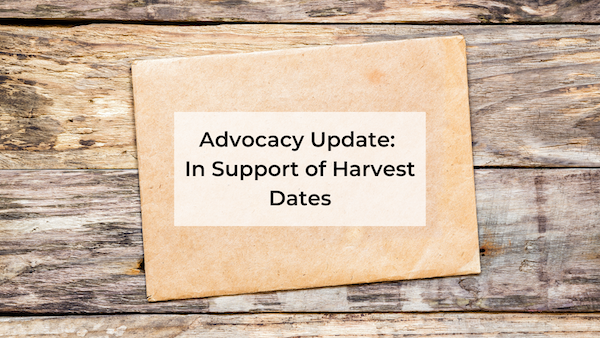
The American Cider Association (ACA) recently sent a letter to the TTB voicing the ACA’s support of a specific proposed labeling rule included in Notice 176, published in late 2018.
NOTICE 176
The notice contained proposed rules for modernizing wine (including cider), spirits and malt beverages labeling and advertising regulations. The ACA, many regional cider guilds and dozens of our members submitted comments on the notice during the official comment period. The comments included support for many but not all of the proposed rules.
Some positive change has resulted from those comments. We are hopeful our letter will usher further TTB announcements in favor of our official comments first made in 2019. This letter is our third mention of our support of harvest dates since our official comments posted.
OUR LETTER
The ACA’s recent letter to the TTB reiterated our support for the Notice 176 proposal to allow the use of harvest dates on qualifying wines and ciders. Harvest dates would create an important opportunity to distinguish a maker’s cider from season to season. Read our letter for further details of the proposal and our reasons for supporting it.
THE VOICE OF THE INDUSTRY
Our members’ support allows the ACA to amplify the voice of cider and to develop relationships with the TTB and others for the benefit of our industry. Through the collective power of our members, we have a stronger voice for cider when it matters. Our recent letter in support of harvest dates is one example of our commitment to advancing the needs of all cider producers, big or small.
We are grateful for the TTB for seeking the input of industry members regarding the proposed rules in Notice 176, and we eagerly await further announcements regarding the creation of harvest dates.
ACA Comments on Competition
The Department of the Treasury issued a “Request for Information (RFI) to solicit input regarding the current market structure and conditions of competition in the American markets for …[alcohol producers], including an assessment of any threats to competition and barriers to new entrants.” This RFI was in response to an Executive Order (EO) by President Biden issued on July 9, 2021. The EO focuses broadly on consolidation, but a specific section on beverage alcohol was included in the EO. That section addressed patterns of consolidation and unnecessary trade practice regulations in “wine, beer and spirits markets…that impede market access for smaller and independent brewers, winemakers, and distilleries.” On August 18, 2021, the ACA submitted comments addressing a range of challenges our member cideries face in these areas including wholesaler consolidation, tied-house laws, packaging supply, standards of fill, carbonation taxes, geographic indicators, harvest dates and more. You can read our public comment letter here.
The American Cider Association voices the policy and regulatory needs of cideries in Washington D.C. One of our principal strategic goals is that common sense policies and regulations at the national level support the continued growth and sustainability of the US cider industry. As a big tent organization, we work hard to ensure that all of our members benefit from our advocacy. We are excited to see small producers especially highlighted by the EO. We celebrate this opportunity to address competition and trade practices in the beverage alcohol market and we thank our members for supporting this effort.
You can read all the submitted comments on the EO on the TTB’s comment docket.
For questions or comments, please contact our executive director, Michelle McGrath, at Michelle@ciderassociation.org. To support the ACA’s advocacy work, consider joining as a member today.
Email Your Rep About Supporting the Fairness for Craft Beverages Act
Craft beverage producers who rely on direct to consumer sales were some of the hardest economically hit businesses in the Covid-19 pandemic. The year-end Covid-relief package allowed certain businesses (under NAICS code 72) to apply for 3.5 times their average monthly payroll on second draw PPP loans, but many cideries with prominent tasting rooms were excluded from the expanded relief. The Fairness for Craft Beverage Producers Act will ensure that cideries, wineries, meaderies, distilleries and breweries can receive the expanded funding. This would include businesses that fall under NAICS 3121 series and derive at least 35% of gross annual revenue during either calendar year 2019 or 2020 from in-person sales of products.
The American Cider Association is dedicated to advocating for the fair treatment of America’s cider industry. Will you join us in reaching out to your member of Congress about supporting this bill?
BREAKING NEWS: TTB Approves Additional Wine Standards of Fill
In a special edition newsletter sent to subscribers on December 28, 2020, the TTB announced new rules regarding standards of fill. The additional volumes approved for wine are:
- 355 ml (12 oz)
- 250 ml
- 200 ml
As all ciders are regulated as wine by the TTB, the above sizes are now being added as approved for cider. This means ciders above 7% will be able to be packaged in a 12 oz can or bottle for the first time. Previously, a state exemption was required to package ciders over 7% ABV in 355 ml packaging.
“These new container sizes will provide bottlers with flexibility by allowing the use of the added container sizes, and will facilitate the movement of goods in domestic and international commerce, while also providing consumers broader purchasing options,” the TTB writes in their newsletter.
The TTB newsletter included a final draft of the rule. The rule includes several mentions of submitted commentary from cidermakers and the American Cider Association (ACA) (formerly United States Association of Cider Makers).
An excerpt: “These producers note that, in the production of cider, apples often naturally ferment to an alcohol by volume (abv) level just above 7.4%, so producers often take steps to lower the abv below 7% so that the standards of fill regulations will not apply, enabling them to use 355 milliliter containers. They state that sugar levels in apples vary widely depending on climate and other factors, making final alcohol levels difficult to predict. They argue that being able to use the 355 milliliter container size will eliminate this uncertainty.”
“The ACA government affairs committee worked to make this happen,” said Michelle McGrath, executive director of ACA. “Additionally, so many of our members came together to provide comments. Our united voices made the difference.”
“ACA believes that this will help apple-focused cidermakers and others with packaging flexibility and compliance,” McGrath added.
The addition of 200 ml containers is also a win for US ice cider producers. “This will help our ice cider business, where 200ml has been a traditional ice wine bottle size outside the US for decades, and we have not had access to that format,” said ice cider producer and ACA board member, Eleanor Leger.
“There are many styles of cider, and packaging flexibility will allow us to deliver the right cider to the customer in the right package. We are excited that we can finally put ciders produced with heirloom and tannic varieties in a more accessible format for customers,” Leger added.
The American Cider Association is grateful to the TTB for providing a platform for industry and public comment. “We are very pleased that the TTB continues to work with industry to evaluate regulation and its relevance to current market conditions,” ACA board President Paul Vander Heide said. “Broadening standards of fill gives our members increased flexibility to serve their customers.”
📣 ACTION ALERT: Renew the Craft Beverage Modernization and Tax Reform Act
Cideries like yours are facing the harsh economic realities of a global pandemic. Congress needs to be proactive in supporting small businesses like yours right now, but they also need to protect you from further economic harm. In a normal year, raising Federal Excise Taxes could significantly damage our industry’s viability. In 2021, raising taxes could force hundreds of cideries to permanently close their doors. Join us in urging Congress to act urgently and make the Craft Beverage Modernization and Tax Reform Act permanent NOW.
This will impact all segments of the cider industry. It’s critical we work together in reaching out to lawmakers today or come January 1, your Federal Excise Taxes may go up significantly.
Please reach out to Congress today and tell them your business needs a break: Make the Craft Beverage Modernization and Tax Reform Act permanent!
Stop Tax Increases
The Craft Beverage Modernization and Tax Reform Act EXPIRES at the end of 2019.
The Craft Beverage Modernization and Tax Reform Act created critical but temporary excise tax credits for beer, wine, spirit and cider producers. This cross-sector cooperation was unprecedented, and the results have been clear—our industries create jobs, support farms, and bolster community economies. Now we are working together again to prevent your taxes from going up come January 1. Congress needs to hear from the cider community that increasing federal excise taxes will cost. The resources that allowed you to invest in jobs, trees, equipment and innovations could go away overnight. Join us in telling Congress to stop these pending tax hikes and make the savings in the Craft Beverage Modernization and Tax Reform Act permanent.
From coast to coast, producers are making their voices heard. Our industries have two things in common—the vast majority of the businesses in our sectors are small, family-owned businesses, and our fermented products create added value for farms. These facts have led to overwhelming bipartisan support for the Craft Beverage Modernization and Tax Reform Act. But we need to hammer this message home: The loss of these credits will hurt local economies. Congress must act to make them permanent before it’s too late.
Want to learn more about how this bill impacts your cidery? Read our recent blog.

